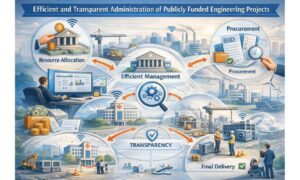Introduction
In the dynamic landscape of the modern workforce, human resources (HR) plays a pivotal role in ensuring the success and sustainability of any organization. The field of HR is not just about managing paperwork and personnel; it requires a unique set of skills and qualifications to navigate the complexities of today’s business environment. In this comprehensive guide, we will explore the qualifications necessary for human resources professionals, shedding light on the key competencies, education, certifications, and experience that make for a successful HR career.
I. Educational Qualifications
A. Bachelor’s Degree in Human Resources or a Related Field
At the foundation of a successful HR career lies a solid educational background. A bachelor’s degree in human resources, business administration, or a related field is often considered the entry point. The curriculum typically covers essential HR topics such as recruitment, employee relations, compensation and benefits, organizational behavior, and labor laws.
Additionally, a background in psychology, sociology, or industrial-organizational psychology can provide valuable insights into human behavior and organizational dynamics, enhancing an HR professional’s ability to understand and manage diverse workplace challenges.
B. Master’s Degree for Advanced Specialization
While a bachelor’s degree may open the door to entry-level HR positions, a master’s degree can significantly boost an HR professional’s career prospects. Pursuing a Master’s in Human Resources Management, Industrial Relations, or a related field allows individuals to delve deeper into specialized areas such as talent management, strategic HR planning, and organizational development.
Many HR leaders hold advanced degrees, and the knowledge gained at this level can be instrumental in taking on leadership roles within the HR domain.
II. Professional Certifications
Professional in Human Resources (PHR) and Senior Professional in Human Resources (SPHR) (700 words)
HR professionals often pursue certifications to validate their expertise and enhance their marketability. The PHR and SPHR certifications, offered by the Human Resource Certification Institute (HRCI), are widely recognized and respected in the industry.
The PHR certification is ideal for those in the early stages of their HR career, while the SPHR certification is designed for seasoned professionals in leadership roles. These certifications cover various HR domains, including workforce planning, employee relations, and organizational development.
Society for Human Resource Management Certified Professional (SHRM-CP) and Senior Certified Professional (SHRM-SCP) (600 words)
Another set of highly regarded certifications comes from the Society for Human Resource Management (SHRM). The SHRM-CP and SHRM-SCP certifications cater to HR professionals seeking a broader understanding of global HR principles and practices.
These certifications focus on competencies such as leadership and navigation, ethical practice, business acumen, and critical evaluation. Earning SHRM certifications demonstrates a commitment to staying abreast of the latest HR trends and best practices.
III. Essential Skills and Competencies
A. Communication and interpersonal skills
Effective communication is at the heart of HR. HR professionals must be adept at conveying complex information, actively listening, and resolving conflicts. Strong interpersonal skills are essential for building relationships with employees, management, and external stakeholders.
B. Problem-Solving and Decision-Making Abilities
HR often involves navigating through challenging situations. Professionals in this field need to possess strong problem-solving and decision-making skills to address issues ranging from employee disputes to organizational restructuring. The ability to analyze data and make informed decisions is crucial.
C. Ethical and Confidentiality Standards
HR deals with sensitive employee information and confidential matters. Upholding ethical standards and maintaining confidentiality are paramount. HR professionals must demonstrate integrity and discretion in handling delicate situations.
IV. Relevant Experience
A. Internships and entry-level roles
Gaining hands-on experience through internships and entry-level positions is invaluable for aspiring HR professionals. This exposure allows individuals to apply theoretical knowledge to real-world scenarios, honing their skills in recruitment, onboarding, and employee relations.
B. Progressive Experience in Various HR Functions
As HR professionals advance in their careers, acquiring experience in different HR functions is crucial. This could include roles in recruitment, training and development, compensation and benefits, and employee engagement. A well-rounded background prepares HR leaders to take on more strategic and senior-level responsibilities.
Conclusion
The qualifications for human resources professionals extend beyond academic degrees. A successful HR career is built on a foundation of education, certifications, and a diverse set of skills and experiences. As organizations continue to evolve, the role of HR becomes increasingly complex, requiring professionals to stay informed, adaptable, and ethical in their practices. By understanding and embodying the qualifications outlined in this comprehensive guide, aspiring and current HR professionals can position themselves for success in the ever-changing landscape of human resources.



































